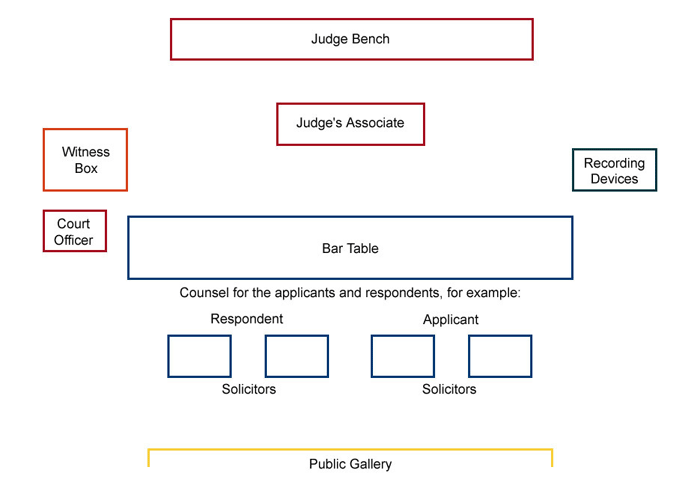Understanding court procedures can be confusing, but being prepared is key. Dressing professionally, bringing the necessary documents, and behaving respectfully In Sydney, court proceedings follow a structured process, from initial appearance to hearings. This article will break down all these areas of a court appearance in more depth.
Trust Jameson Law for expert legal representation—they’re dedicated to fighting for your rights and will help you navigate through all the processes of your next appearance in court. Remember, we’re in it to win it!
What should I wear while attending court?
When attending court in Australia, it’s essential to dress respectfully and professionally. Opt for neat, conservative attire such as business attire or smart casual clothing. Men can wear a suit or dress pants with a collared shirt, while women can choose a pantsuit, dress, or skirt with a blouse.
Avoid wearing clothing that is too casual, revealing, or flashy, as it may not be appropriate for the solemn atmosphere of the courtroom. Closed-toe shoes are preferable, and accessories should be kept minimal. Additionally, as the Federal Circuit and Family Court of Australia points out, you should make sure to take off your sunglasses, hats or caps before you enter the courtroom.
Being on time to court is extremely important. If you are late to your hearing or committal proceedings, If the Judge decides, you could be penalised. The maximum penalty that you face could be severe.
In a nutshell...
Procedures to follow
Addressing the Judge or Judicial Registrar:
In Sydney courts, it’s important to address the Judge as “Your Honour” when speaking to them. For Judicial Registrars, use “Registrar” unless told otherwise. For example, you might say “Yes, your Honour” when addressing a Judge and “Yes, Registrar” when speaking to a Judicial Registrar.
Courtroom Etiquette:
As the Federal Court of Australia writes about here, Upon entering or leaving a courtroom with a Judge or Judicial Registrar present, it’s customary to bow your head as a sign of respect. This is something you should do in all courts, whether it be a family court, federal court or any other court of New South Wales.
Court Proceedings:
When your case is called, approach the Bar Table at the front of the courtroom and state your name to the Judge or Judicial Registrar. They will inquire about your claim and may set a timetable for the next steps, such as submitting evidence and pleadings. It’s a good idea to discuss timelines with the other party beforehand. Rule 5.04 outlines the types of orders a Judge may issue.
By following these procedures, you ensure smooth communication and respectful conduct in Sydney courts. Contact Jameson Law today for a consultation. Whether it be a question about a court procedure, Maximum Penalties or how to move a hearing date, Jameson Law is a one-stop shop for all your legal needs!
What should I Bring to Court?
When heading to court in Sydney, it’s crucial to be prepared. Here’s what you should bring:
Legal Documents: Bring any relevant paperwork related to your case, including court orders, summons, or legal agreements. It is important to bring 3 sets of documents with you to the court, one set for you, one set for the other party and another set for the judge or registrar. This ensures that court events go as smoothly as possible!
Identification: Carry a valid form of identification, such as a driver’s license or passport, to verify your identity if needed.
Notes and Evidence: Take notes on key points you want to remember and bring any evidence or documents supporting your case.
Contact Information: Have contact details for your lawyer, if you have one, and any witnesses or other parties involved in the case.
Pen and Paper: Bring a pen and notebook to jot down important information during the proceedings.
A good lawyer: A good lawyer can make all the difference in court. The expert lawyers at Jameson Law are perfect examples of this. Before you get to the courtroom, they will make you understand in depth what is going on. having your understanding of what would happen if you plead guilty, what the maximum penalties might be, or things like how to move a hearing date to make proceedings move as smoothly as possible.
Patience and Respect: Lastly, bring patience and a respectful attitude. Court proceedings can be lengthy and sometimes stressful, so maintaining composure and showing respect for the court and others involved is essential for a smooth process.
Importance of a good lawyer during court proceedings
In court proceedings, a proficient lawyer is essential, and Jameson Law stands out as an expert law firm in Sydney. A skilled lawyer, like those at Jameson Law, provides invaluable guidance, strategic representation, and unwavering support. With their expertise, they navigate complex legal processes, protect your rights, and strive for favourable outcomes.
Jameson Law offers personalized attention, ensuring you understand your case and make informed decisions. Their dedication to achieving the best results means you have a strong ally in the courtroom, advocating fiercely for your interests. Trusting Jameson Law ensures you have top-tier legal representation when you need it most.
Court behaviour
In Sydney courts, proper behaviour is essential. Remember to switch off your mobile phone and nod respectfully when entering or leaving the room. Stand when addressing the judge or when they speak to you, and speak clearly without interrupting others.
Be polite to everyone, including the judge or registrar and other parties involved. Take notes to stay organized and track important points. By following these guidelines, you demonstrate respect for the court and ensure smooth proceedings during your time in Sydney courtrooms.
Court Appearances in Local Courts
In Sydney, court appearances follow a structured process. Initially, when your case is brought before a magistrate, the charge will be recorded, and the final decision may be postponed to another date. If you plead guilty, sentencing might occur immediately for minor charges, but for more serious offences, the magistrate may request a pre-sentence report. If granted bail, you’ll receive a bail notice detailing your court appearance. Upon arrival, check the court lists for your assigned courtroom and be present when your case is called to avoid repercussions, especially if you’re on bail.
Between initial appearances and hearings, there may be several ‘callovers’ or ‘mentions’ to schedule the case within the court timetable. Pleas of guilty or not guilty can be lodged during these appearances. Guilty pleas may lead to immediate sentencing or a later date set for sentencing. Not guilty pleas result in the matter being scheduled for a hearing. It’s crucial to coordinate with your witnesses and lawyer for hearing dates. Requesting adjournments can be challenging, so being prepared and proactive is essential to navigate court appearances effectively in Sydney.
Speak to a lawyer today
Facing a legal matter in Sydney? Trust Jameson Law to navigate the complexities of the courtroom with expertise and dedication. Our experienced team will stand by your side, providing personalized legal representation tailored to your needs. From criminal defence to family law matters, we're here to fight for your rights and achieve the best possible outcome. Don't face the legal system alone—let Jameson Law be your advocate. Contact us today for a consultation, and remember, we are in it to win it!
Layout of a Court Room

In a typical courtroom, the layout is structured to facilitate proceedings efficiently. The Federal Court of Australia provides a great diagram that lays out the layout of a courtroom.
Bench: The Judge or Judicial Registrar sits here, facing the Court.
Associate Table: Positioned in front of the bench, the Associate to the Judge or a staff member assisting a Judicial Registrar sits here, facing the Court.
Bar Table: Located in front of the bench, this is where your lawyers sit. Jameson Law’s expert team of court lawyers takes great pride in representing defendants here!
Court Officer Area: The Court Officer may sit near the Bar Table or at the Associate’s Table. If the court processes require it, this might also be a Court Child expert present. These are individuals employed by the Court Children’s Service and cover various roles like a family counsellor, consultant, or Dispute Resolution Practitioner under the Family Law Act 1975. They specialize in assisting children involved in legal matters.
Witness Box: Placed strategically for visibility, witnesses testify here.
Transcript Area: This space is reserved for recording court hearings.
Public Gallery: Open seating for the general public to observe proceedings.

 (02) 8806 0866
(02) 8806 0866 





